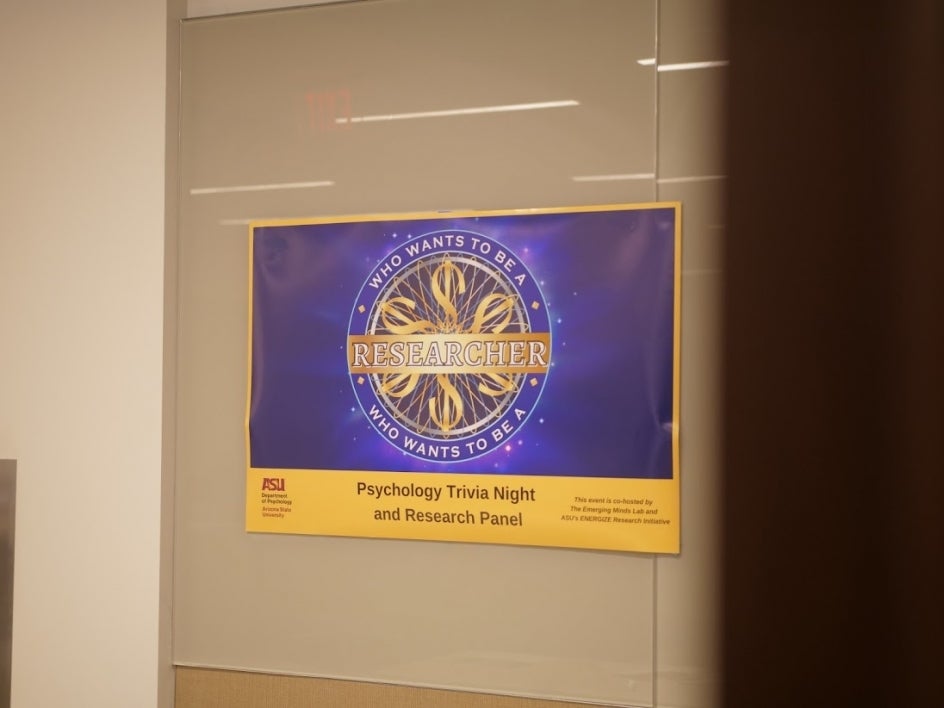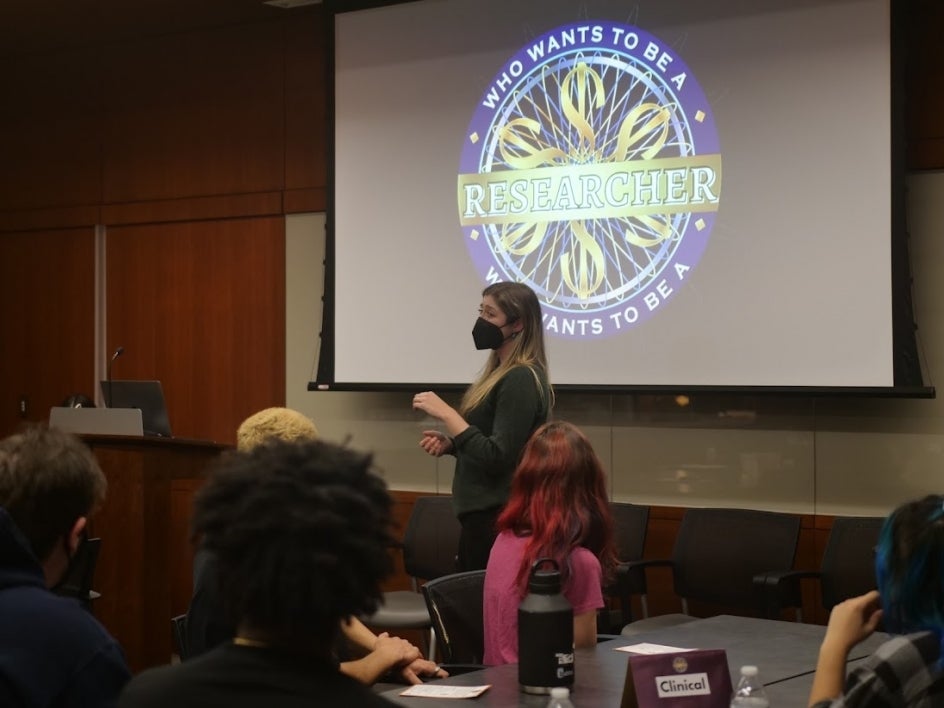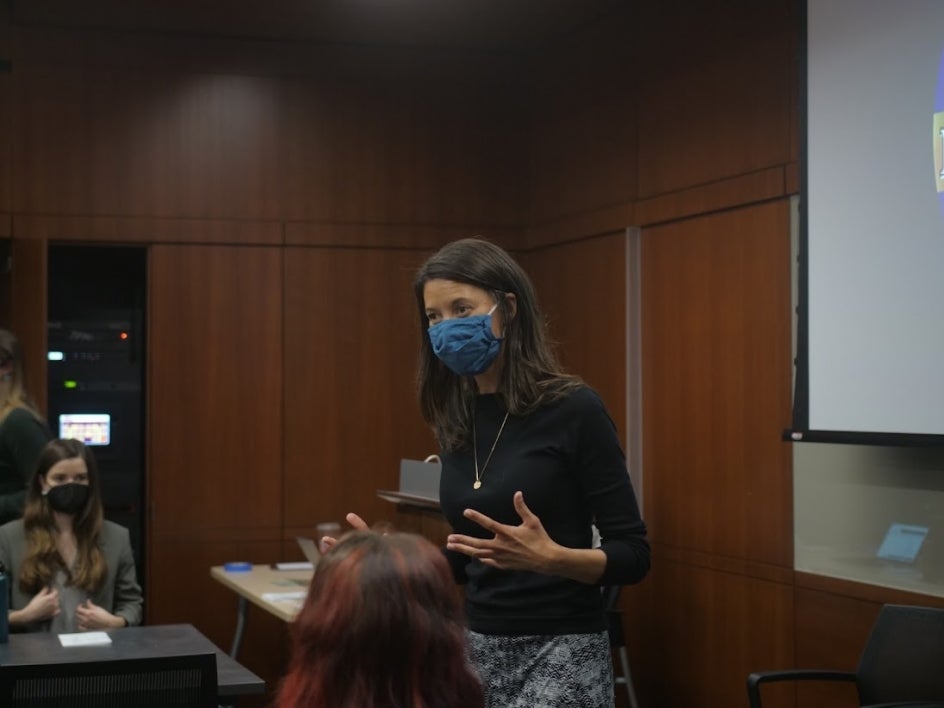Emerging Minds Lab receives NSF CAREER grant to expand access to research

This spring, the Emerging Minds Lab at ASU hosted a “Who Wants to Be a Researcher?” trivia night, modeled in the same format as the game show and featuring questions about psychology, ranging from neurons to Sigmund Freud.
A new grant from the National Science Foundation (NSF) is allowing the Emerging Minds Lab, directed by Arizoan State University psychology Assistant Professor Kelsey Lucca, to expand access to research for undergraduate students and the community.
The Emerging Minds Lab explores the genesis of learning and curiosity in children, and, with this new funding, they are able to involve more undergraduate students in this work.
The Department of Psychology at ASU has long been proud of the research done by undergraduate research assistants in its labs and has recently been focusing on how to improve access to research for students who may not feel like they can participate. These students may have time, financial or logistical barriers to entry, such as needing transportation or working multiple jobs to support their families.
The $800,000 grant is provided by the NSF CAREER Award “Cultivating Curiosity to Promote Learning and Discovery," which will provide funding over the next five years to promote the understanding of curiosity and its formation.
“Curiosity is so important for so many different facets of life. Curiosity leads to enhanced engagement and achievement in science, technology, engineering and mathematics (STEM) fields, improved psychological well-being and healthy aging,” Lucca said. “Despite the importance of studying curiosity, we still have very little basic knowledge about curiosity, how it develops and how to promote it. This is because curiosity is notoriously difficult to study, especially in infants and young children”
The grant will fund research on curiosity drawing from cognitive science, developmental science and education to investigate:
- What are the cognitive processes involved in early curiosity?
- How does curiosity unfold across infancy and early childhood?
- What role does the social environment play in shaping curiosity?
- How does curiosity impact STEM learning readiness?
- What factors cause increases in preschool-aged children’s curiosity?
The grant also supports outreach and educational activities.
“A big part of the outreach is thinking about how we can make research more accessible to students who might not have known about it, or know how to get involved. This grant is all about coming up with new ideas and ways to engage with students, pushing the boundaries of what has been done before,” Lucca said.
This spring, the lab hosted a “Who Wants to Be a Researcher?” trivia night, modeled in the same format as the game show and featuring questions about psychology, ranging from neurons to Sigmund Freud. Lab managers Sarah Kiefer (now a developmental psychology PhD student at Brown University) and Vanessa Lazaro (now a developmental psychology PhD student at the University of Chicago) helped with formulating the first event of the grant and creating the creative material to advertise to students.
Paola Hernandez, an honor’s student in the Emerging Minds Lab and recipient of the Janessa Shapiro Undergraduate Research Scholarship, along with Jeri Sasser, ASU psychology graduate student and student representative for ASU's ENERGIZE program, which helps connect students with research experience during their undergraduate career, also played an integral role in the evening.
“We wanted to make it a special event that was not just coming to listen to a panel of faculty speak about research,” Lucca said. “We ended the night with an ice cream sandwich cart and distributed packets with next steps and tangible ways they could get involved in research if they were interested.”
Faculty were paired up with students based on their research interests, and they competed as a team in order to win the trivia night and to increase their exposure to psychology concepts.
The main purpose of the event was to reduce the barrier to entry for students who were interested in gaining connections with psychology faculty and eventually joining a research lab. The informal setting allowed students to see that they have common ground with psychology faculty who care about their interests and long-term dreams.
“Trivia is a very humbling experience. We had everyone from undergraduate students, graduate students, research staff, junior professors, tenured faculty members, to retired faculty members attend, but the questions really evened the playing field,” Lucca said. “That made it a lot of fun – everyone was laughing and smiling. That to me was a sign of a successful experience. It was fun to see faculty members getting questions wrong and showing the students that it is OK to make mistakes, to laugh and learn.”
It was important to Lucca that the students saw the faculty as approachable and for them to understand that reaching out to a faculty member doesn’t need to be a stressful experience.
“We partnered with ASU's ENERGIZE program, which has a shared goal of 'energizing' students’ interest in psychology, to design and execute the event,” she said.
After the successful event, they plan on building it to be even larger in 2023, and launch a new yearly summer internship program for undergraduate students.
“This was a great trial run, and we really learned a lot about what makes an outreach event valuable to students,” said Lucca.
More Science and technology

ASU professor breeds new tomato variety, the 'Desert Dew'
In an era defined by climate volatility and resource scarcity, researchers are developing crops that can survive — and thrive —…

Science meets play: ASU researcher makes developmental science hands-on for families
On a Friday morning at the Edna Vihel Arts Center in Tempe, toddlers dip paint brushes into bright colors, decorating paper…

ASU water polo player defends the goal — and our data
Marie Rudasics is the last line of defense.Six players advance across the pool with a single objective in mind: making sure that…




